
List of museums in Derbyshire
Encyclopedia
This list of museums in Derbyshire
, England
contains museum
s which are defined for this context as institutions (including nonprofit organization
s, government entities, and private business
es) that collect and care for objects of cultural, artistic, scientific, or historical interest and make their collections or related exhibits available for public viewing. Also included are non-profit art galleries and university art galleries. Museums that exist only in cyberspace (i.e., virtual museum
s) are not included.
Derbyshire
Derbyshire is a county in the East Midlands of England. A substantial portion of the Peak District National Park lies within Derbyshire. The northern part of Derbyshire overlaps with the Pennines, a famous chain of hills and mountains. The county contains within its boundary of approx...
, England
England
England is a country that is part of the United Kingdom. It shares land borders with Scotland to the north and Wales to the west; the Irish Sea is to the north west, the Celtic Sea to the south west, with the North Sea to the east and the English Channel to the south separating it from continental...
contains museum
Museum
A museum is an institution that cares for a collection of artifacts and other objects of scientific, artistic, cultural, or historical importance and makes them available for public viewing through exhibits that may be permanent or temporary. Most large museums are located in major cities...
s which are defined for this context as institutions (including nonprofit organization
Nonprofit organization
Nonprofit organization is neither a legal nor technical definition but generally refers to an organization that uses surplus revenues to achieve its goals, rather than distributing them as profit or dividends...
s, government entities, and private business
Business
A business is an organization engaged in the trade of goods, services, or both to consumers. Businesses are predominant in capitalist economies, where most of them are privately owned and administered to earn profit to increase the wealth of their owners. Businesses may also be not-for-profit...
es) that collect and care for objects of cultural, artistic, scientific, or historical interest and make their collections or related exhibits available for public viewing. Also included are non-profit art galleries and university art galleries. Museums that exist only in cyberspace (i.e., virtual museum
Virtual museum
A virtual museum is a museum that exists only online. A virtual museum is also known as an online museum, electronic museum, hypermuseum, digital museum, cybermuseum or Web museum...
s) are not included.
Museums
To use the sortable table, click on the icons at the top of each column to sort that column in alphabetical order; click again for reverse alphabetical order.| Name | Image | Town/City | Type | Summary |
|---|---|---|---|---|
| Bakewell Old House Museum | Bakewell Bakewell Bakewell is a small market town in the Derbyshire Dales district of Derbyshire, England, deriving its name from 'Beadeca's Well'. It is the only town included in the Peak District National Park, and is well known for the local confection Bakewell Pudding... |
Multiple | website, historic Tudor house with period rooms, Victorian mill workers dwelling, textiles, toys | |
| Barrow Hill Roundhouse & Railway Centre Barrow Hill Engine Shed Barrow Hill Roundhouse & Railway Centre, until 1948 known as Staveley Roundhouse & Train Centre, is a former Midland Railway roundhouse in Barrow Hill, near Staveley and Chesterfield, Derbyshire .-History:... |
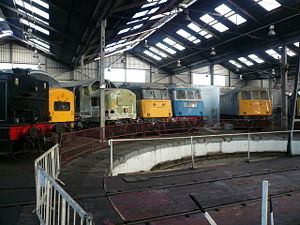 |
Barrow Hill Barrow Hill, Derbyshire Barrow Hill is a village in Derbyshire north-east of the town of Chesterfield. It was formerly the site of Barrow Hill railway station, and is also the site of Barrow Hill Engine Shed. It also has its own primary school, Barrow Hill Primary School and a new park which it won over New Whittington... |
Railway | Preserved roundhouse Roundhouse A roundhouse is a building used by railroads for servicing locomotives. Roundhouses are large, circular or semicircular structures that were traditionally located surrounding or adjacent to turntables... and locomotives |
| Belper Heritage Centre | 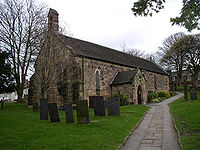 |
Belper Belper Belper is a town and civil parish in the local government district of Amber Valley in Derbyshire, England.-Geography:Belper is situated eight miles north of Derby and is centred in the valley of the River Derwent... |
Local | information, local history, also known as St. John’s Chapel Heritage Centre |
| Bolsover Castle Bolsover Castle Bolsover Castle is a castle in Bolsover, Derbyshire, England .-History:It was built by the Peverel family in the 12th century and became Crown property in 1155 when the third William Peverel fled into exile... |
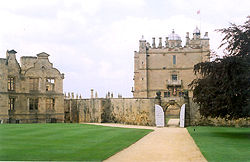 |
Bolsover Bolsover Bolsover is a town near Chesterfield, Derbyshire, England. It is 145 miles from London, 18 miles from Sheffield, 26 miles from Nottingham and 54 miles from Manchester. It is the main town in the Bolsover district.The civil parish for the town is called... |
Historic house | Operated by English Heritage English Heritage English Heritage . is an executive non-departmental public body of the British Government sponsored by the Department for Culture, Media and Sport... |
| Buxton Museum and Art Gallery | 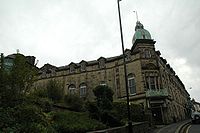 |
Buxton Buxton Buxton is a spa town in Derbyshire, England. It has the highest elevation of any market town in England. Located close to the county boundary with Cheshire to the west and Staffordshire to the south, Buxton is described as "the gateway to the Peak District National Park"... |
Multiple | Local history, archaeology, fossils and minerals, natural history, art |
| Calke Abbey Calke Abbey Calke Abbey is a Grade I listed country house near Ticknall, Derbyshire, England, in the care of the charitable National Trust.The site was an Augustinian priory from the 12th century until its dissolution by Henry VIII... |
Ticknall Ticknall Ticknall is a small village and civil parish in South Derbyshire, England. Situated on the A514 road, close to Melbourne, it has three pubs, several small businesses, and a primary school. Two hundred years ago it was considerably larger and noisier with lime quarries, tramways and potteries. Coal... |
Historic house | Operated by the National Trust National Trust for Places of Historic Interest or Natural Beauty The National Trust for Places of Historic Interest or Natural Beauty, usually known as the National Trust, is a conservation organisation in England, Wales and Northern Ireland... , Baroque country house and garden |
|
| Carnfield Hall Carnfield Hall Carnfield Hall is a privately owned country house located at South Normanton, near Alfreton in Derbyshire, England. It is a Grade II* listed building... |
South Normanton South Normanton South Normanton is a medium-sized ex-mining village two miles east of Alfreton, Derbyshire and is approximately 155 metres above sea level at one of the highest points, near St... |
Historic house | Country house and park, open by appointment on guided tours | |
| Casterne Hall Castern Hall Castern Hall is a privately owned 18th century country house, the home of the Hurt family, situated in the Manifold Valley, near Ilam, Staffordshire. It is a Grade II* listed building. It is also spelled 'Casterne'.... |
Ashbourne Ashbourne, Derbyshire Ashbourne is a small market town in the Derbyshire Dales, England. It has a population of 10,302.The town advertises itself as 'The Gateway to Dovedale'.- Local customs :... |
Historic house | website, 18th century manor house, outbuildings | |
| Castleton Village Museum | Castleton | Local | information, local history museum in the Castleton Visitor Centre | |
| Chatsworth House Chatsworth House Chatsworth House is a stately home in North Derbyshire, England, northeast of Bakewell and west of Chesterfield . It is the seat of the Duke of Devonshire, and has been home to his family, the Cavendish family, since Bess of Hardwick settled at Chatsworth in 1549.Standing on the east bank of the... |
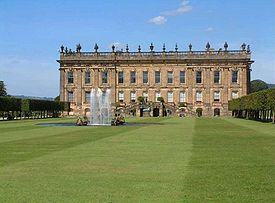 |
Chatsworth Chatsworth, Derbyshire Chatsworth is a civil parish in Derbyshire, England, within the area of the Derbyshire Dales and the Peak District National Park.The population is largely in and around Chatsworth House and is considered to be too low to justify a parish council... |
Historic house | Seat of the Dukes of Devonshire, features priceless paintings, furniture, Old Master drawings, neoclassical sculpture, books and other artefacts, gardens |
| Chesterfield Museum and Art Gallery Chesterfield Museum and Art Gallery Chesterfield Museum and Art Gallery is a local museum and art gallery in the town of Chesterfield, Derbyshire, England.The museum, established in 1994, presents the history of Chesterfield from its origins as a Roman fort to the present. It is located on St Mary's Gate in the Stephenson Memorial... |
Chesterfield Chesterfield Chesterfield is a market town and a borough of Derbyshire, England. It lies north of Derby, on a confluence of the rivers Rother and Hipper. Its population is 70,260 , making it Derbyshire's largest town... |
Multiple | Local history, art | |
| Crich Tramway Village Crich Tramway Village Crich Tramway Village is the recreated historic village that is the setting for the National Tramway Museum in Derbyshire. The village is set around a period street, with several re-built buildings from all over the country, including the facade of the former Assembly Rooms from Derby and the Red... |
Crich Crich Crich is a village in Derbyshire in England. It has the National Tramway Museum inside the Crich Tramway Village, and at the summit of Crich Hill above, a Memorial Tower for those of the Sherwood Foresters regiment who died in battle, particularly in World War I.Built in 1923 on the site of an... |
Open air | Restored period village, home to the National Tramway Museum National Tramway Museum The National Tramway Museum, at Crich, in Derbyshire, England, is situated within Crich Tramway Village, a period village containing a pub, cafe, old-style sweetshop, including the tram depots. The village is also home to the Eagle Press, a small museum dedicated to Letterpress Printing including... |
|
| Cromford Mill Cromford Mill Cromford Mill was the first water-powered cotton spinning mill developed by Richard Arkwright in 1771 in Cromford, Derbyshire, England, which laid the foundation of his fortune and was quickly copied by mills in Lancashire, Germany and the United States... |
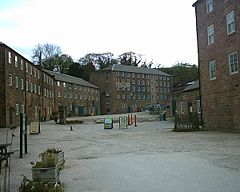 |
Cromford Cromford Cromford is a village, two miles to the south of Matlock in the Derbyshire Dales district in Derbyshire, England. It is principally known for its historical connection with Richard Arkwright, and the Cromford Mill which he built here in 1771... |
Industry | Water-powered cotton spinning mill, part of the Derwent Valley Mills Derwent Valley Mills Derwent Valley Mills is a World Heritage Site along the River Derwent in Derbyshire, England, designated in December 2001. It is administered by the Derwent Valley Mills Partnership. The modern factory, or 'mill', system was born here in the 18th century to accommodate the new technology for... |
| David Mellor Visitor Centre | Hathersage Hathersage Hathersage is a village in the Derbyshire Peak District, in England. It lies on the north bank of the River Derwent, approximately 10 miles west of Sheffield... |
Art | website, museum of cutlery designs of David Mellor, factory and store | |
| Denby Pottery Visitor's Centre | Denby Denby Denby is a village in the English county of Derbyshire that is notable as the birthplace of John Flamsteed, England's first Royal Astronomer, and the location of the Denby Pottery Company.... |
Art | website, small museum of china and porcelain decorative art of the Denby Pottery Company Denby Pottery Company Denby Pottery Company Ltd is a British manufacturer of pottery, and is named after the village of Denby in Derbyshire.-History:The pottery at Denby was founded on the estate of William Drury-Lowe in 1809 as a manufacturer of stoneware bottles. It was run by Joseph Jager in partnership with Robert... , shop and factory tours |
|
| Derby Gaol Derby Gaol The term Derby Gaol historically refers to the five gaols in Derby, England. Today, the term usually refers to one of two tourist attractions, the gaol which stood on Friar Gate from 1756 to 1846 and the cells of which still exist and are open to the public as a museum, and the 1843 to 1929 Vernon... |
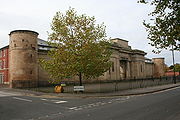 |
Derby Derby Derby , is a city and unitary authority in the East Midlands region of England. It lies upon the banks of the River Derwent and is located in the south of the ceremonial county of Derbyshire. In the 2001 census, the population of the city was 233,700, whilst that of the Derby Urban Area was 229,407... |
Prison | 18th century prison |
| Derby Industrial Museum Derby Industrial Museum Derby Silk Mill, formerly known as Derby Industrial Museum, is a museum of industry and history in Derby, England. The museum is housed in Lombe's Mill, a historic former silk mill which marks the southern end of the Derwent Valley Mills World Heritage Site. Between 1717 and 1721 George Sorocold... |
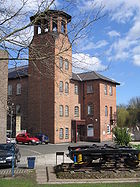 |
Derby Derby Derby , is a city and unitary authority in the East Midlands region of England. It lies upon the banks of the River Derwent and is located in the south of the ceremonial county of Derbyshire. In the 2001 census, the population of the city was 233,700, whilst that of the Derby Urban Area was 229,407... |
Industry | Located in a silk mill, area industries, railway |
| Derby Museum and Art Gallery Derby Museum and Art Gallery Derby Museum and Art Gallery was established in 1879, along with Derby Central Library, in a new building designed by Richard Knill Freeman and given to Derby by Michael Thomas Bass. The collection includes a whole gallery displaying the paintings of Joseph Wright of Derby; there is also a large... |
Derby Derby Derby , is a city and unitary authority in the East Midlands region of England. It lies upon the banks of the River Derwent and is located in the south of the ceremonial county of Derbyshire. In the 2001 census, the population of the city was 233,700, whilst that of the Derby Urban Area was 229,407... |
Multiple | Fine art, porcelains, local history, archaeology, natural history, geology and military collections | |
| Derwent Valley Mills Derwent Valley Mills Derwent Valley Mills is a World Heritage Site along the River Derwent in Derbyshire, England, designated in December 2001. It is administered by the Derwent Valley Mills Partnership. The modern factory, or 'mill', system was born here in the 18th century to accommodate the new technology for... |
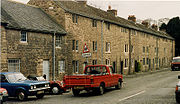 |
Industry | World Heritage Site that includes over 15 historic sites spanning over 15 miles | |
| Erewash Museum Erewash Museum The Erewash Museum is a museum in the town of Ilkeston, Erewash, in Derbyshire, England. The building that houses the museum is named the Dalby House after one of the families who inhabited it, and has served as a school and a private dwelling.... |
Erewash Erewash Erewash is a local government district and borough in eastern Derbyshire, England, to the east of Derby and the west of Nottingham. It contains the towns of Ilkeston, Long Eaton and Sandiacre and fourteen civil parishes.... |
Local | Local history, industry, period rooms, art exhibits | |
| Eyam Hall Eyam Hall Eyam Hall is a 17th century historic house in the village of Eyam, Derbyshire, England, UK, situated in the Hope Valley, off the A623 from Chapel-en-le-Frith to Chesterfield. It is a Grade II* listed building.... |
Eyam Eyam Eyam is a small village in Derbyshire, England. The village is best known for being the "plague village" that chose to isolate itself when the plague was discovered there in August 1665, rather than let the infection spread... |
Historic house | Jacobean manor house with costumes, needlework, family portraits, gardens | |
| Eyam Museum Eyam Museum Eyam Museum is a local museum in the village of Eyam, located in the Peak District, Derbyshire, England.- Overview :Eyam Museum opened on 23 April 1994 as a small museum on a single level. A model of a Derbyshire lead mine was added in 2002. The museum is staffed by volunteers... |
Eyam Eyam Eyam is a small village in Derbyshire, England. The village is best known for being the "plague village" that chose to isolate itself when the plague was discovered there in August 1665, rather than let the infection spread... |
Local | Local history, impact of the Bubonic Plague Bubonic plague Plague is a deadly infectious disease that is caused by the enterobacteria Yersinia pestis, named after the French-Swiss bacteriologist Alexandre Yersin. Primarily carried by rodents and spread to humans via fleas, the disease is notorious throughout history, due to the unrivaled scale of death... in 1665 |
|
| Haddon Hall Haddon Hall Haddon Hall is an English country house on the River Wye at Bakewell, Derbyshire, one of the seats of the Duke of Rutland, occupied by Lord Edward Manners and his family. In form a medieval manor house, it has been described as "the most complete and most interesting house of [its]... |
Bakewell Bakewell Bakewell is a small market town in the Derbyshire Dales district of Derbyshire, England, deriving its name from 'Beadeca's Well'. It is the only town included in the Peak District National Park, and is well known for the local confection Bakewell Pudding... |
Historic house | Medieval manor house and gardens | |
| Hardwick Hall Hardwick Hall Hardwick Hall , in Derbyshire, is one of the most significant Elizabethan country houses in England. In common with its architect Robert Smythson's other works at both Longleat House and Wollaton Hall, Hardwick Hall is one of the earliest examples of the English interpretation of the Renaissance... |
Doe Lea Doe Lea Doe Lea is a small, linear village in the English county of Derbyshire. It is in the Bolsover district of the county. The village runs along the old A617 road. A newer dual carriageway runs parallel to it. The village is also immediately adjacent to junction 29 of the M1 motorway, like its... |
Historic house | Operated by the National Trust National Trust for Places of Historic Interest or Natural Beauty The National Trust for Places of Historic Interest or Natural Beauty, usually known as the National Trust, is a conservation organisation in England, Wales and Northern Ireland... , significant Elizabethan country house, collection of embroideries, gardens, grounds include Stainsby Mill Stainsby Mill Stainsby Mill is a 19th-century flour water mill in Doe Lea, Chesterfield, Derbyshire, England. The mill, which is in full working order, is under the ownership of the National Trust.... |
|
| Heage Windmill | |
Heage Heage The village of Heage in Derbyshire is situated midway between Belper and Ripley and is today famous for its recently-restored six-sailed windmill. Work on building the mill started in 1791 and it was first recorded as working in 1797... |
Mill | website, working windmill built in 1797 |
| High Peak Junction High Peak Junction High Peak Junction, near Cromford, Derbyshire, England, is the name now used to describe the site where the former Cromford and High Peak Railway , whose workshops were located here, meets the Cromford Canal... |
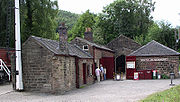 |
Cromford Cromford Cromford is a village, two miles to the south of Matlock in the Derbyshire Dales district in Derbyshire, England. It is principally known for its historical connection with Richard Arkwright, and the Cromford Mill which he built here in 1771... |
Railway | Workshops for the former Cromford and High Peak Railway Cromford and High Peak Railway The Cromford and High Peak Railway in Derbyshire, England, was completed in 1831, to carry minerals and goods between the Cromford Canal wharf at High Peak Junction and the Peak Forest Canal at Whaley Bridge -Origins:... , near the Cromford Canal Cromford Canal The Cromford Canal ran 14.5 miles from Cromford to the Erewash Canal in Derbyshire, England with a branch to Pinxton. Built by William Jessop with the assistance of Benjamin Outram, its alignment included four tunnels and 14 locks.... , part of the Derwent Valley Mills Derwent Valley Mills Derwent Valley Mills is a World Heritage Site along the River Derwent in Derbyshire, England, designated in December 2001. It is administered by the Derwent Valley Mills Partnership. The modern factory, or 'mill', system was born here in the 18th century to accommodate the new technology for... |
| Hope House Costume Museum and Restoration Workshop | Alstonefield Alstonefield Alstonefield is a village and civil parish in the Peak District National Park and the Staffordshire Moorlands district of Staffordshire, England. It is about to the North of Ashbourne, drive East from Leek and south from Buxton... |
Fashion | website, costumes and accessories from 1790 to the 1970s | |
| John King Workshop Museum | Alfreton Alfreton Alfreton is a town and civil parish in Amber Valley, Derbyshire, England, adjoining the Bolsover and North East Derbyshire districts. It was formerly a Norman Manor and later an Urban District. The population of the Alfreton Ward was 7,928 at the 2001 Census... |
Local | information, local industry including Pinxton Pinxton Pinxton is a village on the eastern boundary of Derbyshire in the Bolsover district, England.In Anglo-Saxon times it was a small agricultural community, thought to have been recorded in the Domesday Book as "Esnotrewic." It is also thought that it was known as "Snodeswic," given by Wulfric Spott to... Porcelain, the Mansfield and Pinxton Railway Mansfield and Pinxton Railway The Mansfield and Pinxton Railway was an early horse-drawn railway company in the United Kingdom, constructed in 1819 to transport coal between Mansfield and the head of the Pinxton branch of the Cromford Canal and thence by the Erewash Valley and the Trent to Leicester... , John King who invented the mine cage detaching hook, local social history |
|
| Kedleston Hall Kedleston Hall Kedleston Hall is an English country house in Kedleston, Derbyshire, approximately four miles north-west of Derby, and is the seat of the Curzon family whose name originates in Notre-Dame-de-Courson in Normandy... |
 |
Kedleston Kedleston Kedleston is a village and civil parish in the Amber Valley district of Derbyshire. It lies to the north-west of Derby, and nearby places include Quarndon, Weston Underwood, Mugginton, and Kirk Langley.-History:... |
Historic house | Operated by the National Trust National Trust for Places of Historic Interest or Natural Beauty The National Trust for Places of Historic Interest or Natural Beauty, usually known as the National Trust, is a conservation organisation in England, Wales and Northern Ireland... , 18th century Neoclassical country house, extensive collection of paintings, sculpture and original furnishings, museum of art and items from Asia |
| Leawood Pump House Leawood Pump House The Leawood Pump House was built in 1849 to supply water to the Cromford Canal, built some 50 years previously. It is a Grade II* listed building.... |
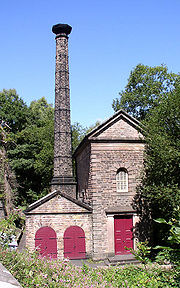 |
High Peak Junction High Peak Junction High Peak Junction, near Cromford, Derbyshire, England, is the name now used to describe the site where the former Cromford and High Peak Railway , whose workshops were located here, meets the Cromford Canal... |
Technology | Part of the Derwent Valley Mills Derwent Valley Mills Derwent Valley Mills is a World Heritage Site along the River Derwent in Derbyshire, England, designated in December 2001. It is administered by the Derwent Valley Mills Partnership. The modern factory, or 'mill', system was born here in the 18th century to accommodate the new technology for... , canal pump house with preserved steam engine |
| Life in a Lens Museum of Photography & Old Times Life in a Lens Museum of Photography & Old Times The Life in a Lens Museum of Photography and Old Times is a museum in Matlock Bath, Derbyshire, England. Opened in 2001, the museum is dedicated to presenting the history of photography from 1839 to around the beginning of the digital age .... |
Matlock Bath Matlock Bath Matlock Bath is a village south of Matlock in Derbyshire, England. Built along the River Derwent, it developed, in the 19th century, as a spa town and still thrives on tourism.-History:In 1698 warm springs were discovered and a Bath House was built... |
Technology | History of photography, cameras, photographic equipment | |
| Little Chester Heritage Centre | Little Chester Little Chester Little Chester, or Chester Green as it is often referred to by locals, is a suburb of the city of Derby, in Derbyshire, England, located directly north of the city centre... |
Local | information, information, local history | |
| M & C Collection of Historic Motorcycles | Bakewell Bakewell Bakewell is a small market town in the Derbyshire Dales district of Derbyshire, England, deriving its name from 'Beadeca's Well'. It is the only town included in the Peak District National Park, and is well known for the local confection Bakewell Pudding... |
Transport | website, motorcycles and memorabilia | |
| Melbourne Hall Melbourne Hall Melbourne Hall, Derbyshire, England was once the seat of the Victorian Prime Minister William Lamb, 2nd Viscount Melbourne, and thus is the ultimate origin for the naming of Melbourne, Australia. The house is now the seat of Lord Ralph Kerr and Lady Kerr and is open to the public... |
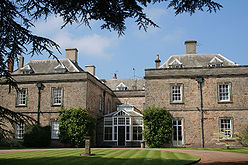 |
Melbourne Melbourne, Derbyshire Melbourne is a Georgian market town in South Derbyshire, England. It is about 8 miles south of Derby and 2 miles from the River Trent. In 1837 a then tiny settlement in Australia was named after William Lamb, 2nd Viscount Melbourne, Queen Victoria's first Prime Minister, and thus indirectly takes... |
Historic house | Country house and gardens |
| Midland Railway – Butterley | Butterley Butterley Butterley is a village in the English county of Derbyshire near to Ripley. It is the site of the Midland Railway - Butterley, as well as the old Butterley Brickworks.- Notable residents :... |
Railway | Formerly known as Midland Railway Centre, heritage railway and museum | |
| Moorland Centre | Edale Edale Edale is a small Derbyshire village and Civil parish in the Peak District, in the Midlands of England. The Parish of Edale,area ,is in the Borough of High Peak.... |
Natural history | website, information, geology, wildlife, plants and importance of the moorland Moorland Moorland or moor is a type of habitat, in the temperate grasslands, savannas, and shrublands biome, found in upland areas, characterised by low-growing vegetation on acidic soils and heavy fog... and Peak District Peak District The Peak District is an upland area in central and northern England, lying mainly in northern Derbyshire, but also covering parts of Cheshire, Greater Manchester, Staffordshire, and South and West Yorkshire.... |
|
| National Stone Centre | Middleton-by-Wirksworth Middleton-by-Wirksworth Middleton-by-Wirksworth is an upland village lying approximately one mile NNW of Wirksworth, Derbyshire, formerly known for its lead mines and high quality limestone quarries, including the remarkable underground quarry site at Middleton Mine... |
Science | website, geology, earth science, mining, uses for rocks and minerals, | |
| National Tramway Museum National Tramway Museum The National Tramway Museum, at Crich, in Derbyshire, England, is situated within Crich Tramway Village, a period village containing a pub, cafe, old-style sweetshop, including the tram depots. The village is also home to the Eagle Press, a small museum dedicated to Letterpress Printing including... |
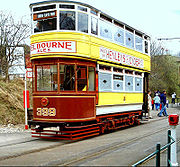 |
Crich Crich Crich is a village in Derbyshire in England. It has the National Tramway Museum inside the Crich Tramway Village, and at the summit of Crich Hill above, a Memorial Tower for those of the Sherwood Foresters regiment who died in battle, particularly in World War I.Built in 1923 on the site of an... |
Railway | Located in Crich Tramway Village Crich Tramway Village Crich Tramway Village is the recreated historic village that is the setting for the National Tramway Museum in Derbyshire. The village is set around a period street, with several re-built buildings from all over the country, including the facade of the former Assembly Rooms from Derby and the Red... , collection of working trams |
| National Trust Museum of Childhood | Sudbury Sudbury, Derbyshire Sudbury is a village and civil parish in Derbyshire, England, located approximately to the south of Ashbourne. It is part of the Derbyshire Dales district. The £0.5m A50 bypass opened in 1972... |
Toy | Operated by the National Trust National Trust for Places of Historic Interest or Natural Beauty The National Trust for Places of Historic Interest or Natural Beauty, usually known as the National Trust, is a conservation organisation in England, Wales and Northern Ireland... , located at Sudbury Hall Sudbury Hall Sudbury Hall is a country house in Sudbury, Derbyshire, England.Sudbury Hall is one the country's finest Restoration mansions and has Grade I listed building status.... |
|
| New Mills Heritage and Information Centre | New Mills New Mills New Mills is a town in Derbyshire, England approximately south-east of Stockport and from Manchester. It is sited at the confluence of the rivers Goyt and Sett, on the border of Cheshire. The town stands above the Torrs, a deep gorge, cut through Woodhead Hill Sandstone of the Carboniferous period... |
Local | website, local history | |
| Old Hall, Norbury | 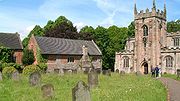 |
Norbury Norbury, Derbyshire Norbury is a village in Derbyshire, England. It is located north of Rocester, on the B5033 road and the River Dove . The hamlet has links with George Eliot's family, the Evans... |
Historic house | Operated by the National Trust National Trust for Places of Historic Interest or Natural Beauty The National Trust for Places of Historic Interest or Natural Beauty, usually known as the National Trust, is a conservation organisation in England, Wales and Northern Ireland... , medieval hall |
| Peak District Mining Museum | Matlock Bath Matlock Bath Matlock Bath is a village south of Matlock in Derbyshire, England. Built along the River Derwent, it developed, in the 19th century, as a spa town and still thrives on tourism.-History:In 1698 warm springs were discovered and a Bath House was built... |
Mining | Lead mining, miner family life | |
| Pickford's House Museum Pickford's House Museum Pickford's House Museum of Georgian Life and Costume is in Derby, England-History:Pickford's House is at No 41 Friar Gate Derby,is an elegant Georgian town house built by the prominent architect Joseph Pickford in 1770 for his own family.... |
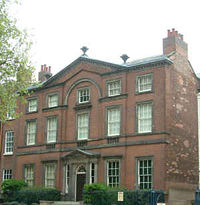 |
Derby Derby Derby , is a city and unitary authority in the East Midlands region of England. It lies upon the banks of the River Derwent and is located in the south of the ceremonial county of Derbyshire. In the 2001 census, the population of the city was 233,700, whilst that of the Derby Urban Area was 229,407... |
Historic house | Late 18th century Georgian townhouse, displays of eighteenth and nineteenth century costume, toys |
| Red House Stables and Carriage Museum | Matlock | Transport | website, original horse drawn vehicles and equipment, blacksmith | |
| Renishaw Hall Renishaw Hall Renishaw Hall is a stately home in Derbyshire, England which dates from the 17th century. It is a Grade I listed building. It has been the home of the Sitwell family for over 350 years.... |
Renishaw Renishaw, Derbyshire Renishaw is a village in the district of North East Derbyshire in England.Renishaw lies on the A6135 between the villages of Eckington and Barlborough. To the west of the village is a section of the Trans Pennine Trail long distance footpath which runs along a former railway line. Adjacent to this... |
Historic house | Country house of the Sitwell family Sitwell Baronets The Sitwell Baronetcy, of Renishaw in the County of Derby, is a title in the Baronetage of the United Kingdom. It was created on 3 October 1808 for Sitwell Sitwell, Member of Parliament for West Looe... , gardens |
|
| Revolution House | 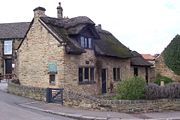 |
Old Whittington Old Whittington Old Whittington is a village in Derbyshire and north of Chesterfield and is/ south-east of Sheffield. The village lies on the River Rother.... |
Historic house | 17th century alehouse with ties to the Glorious Revolution Glorious Revolution The Glorious Revolution, also called the Revolution of 1688, is the overthrow of King James II of England by a union of English Parliamentarians with the Dutch stadtholder William III of Orange-Nassau... of 1688 |
| Royal Crown Derby Visitor Centre Royal Crown Derby The Royal Crown Derby Porcelain Company is a porcelain manufacturer, based in Derby, England. The company, particularly known for its high-quality bone china, has produced tableware and ornamental items since approximately 1750... |
Derby Derby Derby , is a city and unitary authority in the East Midlands region of England. It lies upon the banks of the River Derwent and is located in the south of the ceremonial county of Derbyshire. In the 2001 census, the population of the city was 233,700, whilst that of the Derby Urban Area was 229,407... |
Art | China and porcelain decorative art | |
| Shardlow Heritage Centre | 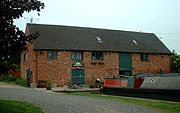 |
Shardlow Shardlow Shardlow is a village in Derbyshire, England about 8 km southeast of Derby and 12 km southwest of Nottingham. It is part of the civil parish of Shardlow and Great Wilne, and the district of South Derbyshire. It is also very close to the border with Leicestershire which follows the River Trent, ... |
Local | website, information, local history |
| Sharpe's Pottery Museum | Swadlincote Swadlincote Swadlincote is a town and unparished area in South Derbyshire, about southeast of Burton-upon-Trent and about south of Derby. It is the main town of South Derbyshire and the seat of South Derbyshire District Council.... |
Art | website, china and porcelain decorative art | |
| Sir Richard Arkwright’s Masson Mills Masson Mill Sir Richard Arkwright's Masson Mill is a water-powered cotton spinning mill situated on the west bank of the River Derwent in Matlock Bath, Derbyshire in England. This mill was built in 1783 and is sited close to the house Richard Arkwright built for himself within the parish of Matlock... |
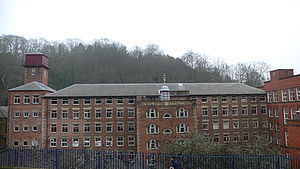 |
Matlock Bath Matlock Bath Matlock Bath is a village south of Matlock in Derbyshire, England. Built along the River Derwent, it developed, in the 19th century, as a spa town and still thrives on tourism.-History:In 1698 warm springs were discovered and a Bath House was built... |
Industry | Water-powered cotton spinning mill, part of the Derwent Valley Mills Derwent Valley Mills Derwent Valley Mills is a World Heritage Site along the River Derwent in Derbyshire, England, designated in December 2001. It is administered by the Derwent Valley Mills Partnership. The modern factory, or 'mill', system was born here in the 18th century to accommodate the new technology for... |
| Stainsby Mill Stainsby Mill Stainsby Mill is a 19th-century flour water mill in Doe Lea, Chesterfield, Derbyshire, England. The mill, which is in full working order, is under the ownership of the National Trust.... |
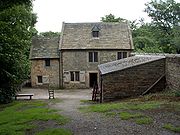 |
Doe Lea Doe Lea Doe Lea is a small, linear village in the English county of Derbyshire. It is in the Bolsover district of the county. The village runs along the old A617 road. A newer dual carriageway runs parallel to it. The village is also immediately adjacent to junction 29 of the M1 motorway, like its... |
Mill | Operated by the National Trust National Trust for Places of Historic Interest or Natural Beauty The National Trust for Places of Historic Interest or Natural Beauty, usually known as the National Trust, is a conservation organisation in England, Wales and Northern Ireland... , 19th-century flour watermill Watermill A watermill is a structure that uses a water wheel or turbine to drive a mechanical process such as flour, lumber or textile production, or metal shaping .- History :... located on the grounds of Hardwick Hall Hardwick Hall Hardwick Hall , in Derbyshire, is one of the most significant Elizabethan country houses in England. In common with its architect Robert Smythson's other works at both Longleat House and Wollaton Hall, Hardwick Hall is one of the earliest examples of the English interpretation of the Renaissance... |
| Strutt's North Mill, Belper Belper North Mill Belper North Mill, also known as Strutt's North Mill, Belper, is one of the Derwent Valley Mills designated UNESCO World Heritage Status in 2001.It is sited in Belper, a town in Derbyshire, England roughly half way between Derby and Matlock.... |
Belper Belper Belper is a town and civil parish in the local government district of Amber Valley in Derbyshire, England.-Geography:Belper is situated eight miles north of Derby and is centred in the valley of the River Derwent... |
Industry | Part of the Derwent Valley Mills Derwent Valley Mills Derwent Valley Mills is a World Heritage Site along the River Derwent in Derbyshire, England, designated in December 2001. It is administered by the Derwent Valley Mills Partnership. The modern factory, or 'mill', system was born here in the 18th century to accommodate the new technology for... , former water powered cotton spinning mill, also includes the Derwent Valley Visitor's Centre |
|
| Sudbury Hall Sudbury Hall Sudbury Hall is a country house in Sudbury, Derbyshire, England.Sudbury Hall is one the country's finest Restoration mansions and has Grade I listed building status.... |
Sudbury Sudbury, Derbyshire Sudbury is a village and civil parish in Derbyshire, England, located approximately to the south of Ashbourne. It is part of the Derbyshire Dales district. The £0.5m A50 bypass opened in 1972... |
Historic house | Operated by the National Trust National Trust for Places of Historic Interest or Natural Beauty The National Trust for Places of Historic Interest or Natural Beauty, usually known as the National Trust, is a conservation organisation in England, Wales and Northern Ireland... , 17th century Restoration style Restoration style Restoration style, also known as Carolean style Restoration style, also known as Carolean style Restoration style, also known as Carolean style (from the Latin Carolus (Charles), refers to the decorative arts popular in England from the restoration of the monarchy in 1660 to the late 1680s after... mansion, features the National Trust Museum of Childhood |
|
| Tissington Hall Tissington Hall Tissington Hall is an early 17th century Jacobean mansion house situated at Tissington, near Ashbourne. Derbyshire. It is a Grade II* listed building.... |
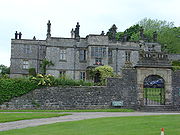 |
Tissington Tissington Tissington is a village in Derbyshire, England. It is part of the estate of Tissington Hall, owned by the FitzHerbert family since 1465. It is regarded as one of the most picturesque English villages and is a popular tourist attraction, particularly during its well dressing week. It also gives its... |
Historic house | Early 17th century Jacobean mansion house |
| Wirksworth Heritage Centre | Wirksworth Wirksworth Wirksworth is a small market town in Derbyshire, England, with a population of over 9,000.The population of the Wirksworth area including Cromford, Bolehill and Middleton-by-Wirksworth is about 12,000. Wirksworth is listed in the Domesday Book in 1086. Within it is the source of the River... |
Local | website, local history | |

